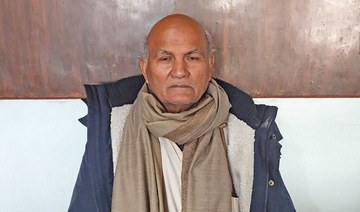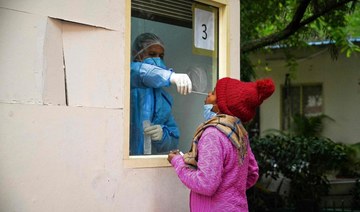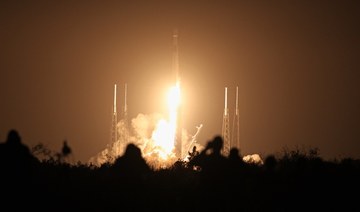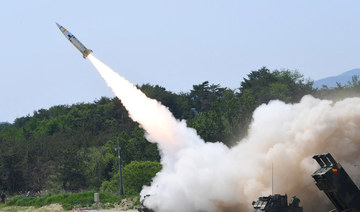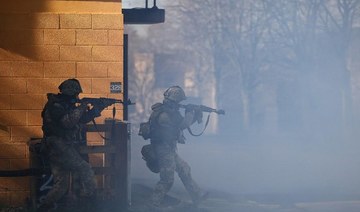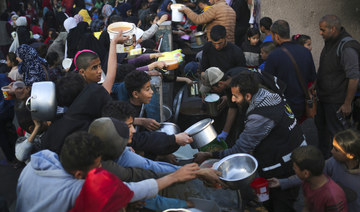MUMBAI: India reported 264,202 new cases of the coronavirus in the last 24 hours, taking its total tally to 36.58 million, the federal health ministry said on Friday.
Deaths from COVID-19 rose by 315, with total mortalities now at 485,350, the ministry said.
India reports 264,202 new coronavirus infections in past 24 hours
https://arab.news/9wgnh
India reports 264,202 new coronavirus infections in past 24 hours

- Deaths from COVID-19 rose by 315, with total mortalities now at 485,350
Russia vetoes a UN resolution calling for the prevention of a dangerous nuclear arms race in space
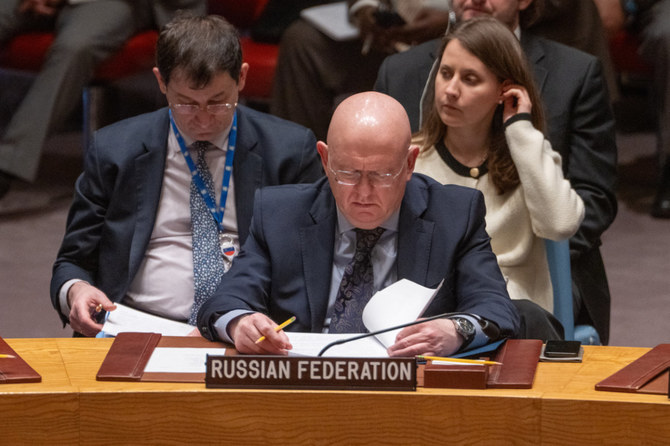
- The vetoed resolution sought to call on all countries not to develop or deploy nuclear arms or other weapons of mass destruction in space
- Russia dismissed the resolution as “absolutely absurd and politicized” and didn’t go far enough in banning all types of weapons in space
UNITED NATIONS: Russia on Wednesday vetoed a UN resolution sponsored by the United States and Japan calling on all nations to prevent a dangerous nuclear arms race in outer space, calling it “a dirty spectacle” that cherry picks weapons of mass destruction from all other weapons that should also be banned.
The vote in the 15-member Security Council was 13 in favor, Russia opposed and China abstaining.
The resolution would have called on all countries not to develop or deploy nuclear arms or other weapons of mass destruction in space, as banned under a 1967 international treaty that included the US and Russia, and to agree to the need to verify compliance.
US Ambassador Linda Thomas-Greenfield said after the vote that Russian President Vladimir Putin has said Moscow has no intention of deploying nuclear weapons in space.

“Today’s veto begs the question: Why? Why, if you are following the rules, would you not support a resolution that reaffirms them? What could you possibly be hiding,” she asked. “It’s baffling. And it’s a shame.”
Putin was responding to White House confirmation in February that Russia has obtained a “troubling” anti-satellite weapon capability, although such a weapon is not operational yet.
US National Security Advisor Jake Sullivan on Wednesday echoed Thomas-Greenfield, reiterating that “the United States assesses that Russia is developing a new satellite carrying a nuclear device.” If Putin has no intention of deploying nuclear weapons in space, Sullivan said, “Russia would not have vetoed this resolution.”
Russia’s UN Ambassador Vassily Nebenzia dismissed the resolution as “absolutely absurd and politicized,” and said it didn’t go far enough in banning all types of weapons in space.
Russia and China proposed an amendment to the US-Japan draft that would call on all countries, especially those with major space capabilities, “to prevent for all time the placement of weapons in outer space, and the threat of use of force in outer spaces.”
The vote was 7 countries in favor, 7 against, and one abstention and the amendment was defeated because it failed to get the minimum 9 “yes” votes required for adoption.
The US opposed the amendment, and after the vote Nebenzia addressed the US ambassador saying: “We want a ban on the placement of weapons of any kind in outer space, not just WMDs (weapons of mass destruction). But you don’t want that. And let me ask you that very same question. Why?”
He said much of the US and Japan’s actions become clear “if we recall that the US and their allies announced some time ago plans to place weapons … in outer space.”
Nebenzia accused the US of blocking a Russian-Chinese proposal since 2008 for a treaty against putting weapons in outer space.
Thomas-Greenfield accused Russia of undermining global treaties to prevent the spread of nuclear weapons, irresponsibly invoking “dangerous nuclear rhetoric,” walking away from several of its arms control obligations, and refusing to engage “in substantive discussions around arms control or risk reduction.”
She called Wednesday’s vote “a real missed opportunity to rebuild much-needed trust in existing arms control obligations.”
Thomas-Greenfield’s announcement of the resolution on March 18 followed White House confirmation in February that Russia has obtained a “troubling” anti-satellite weapon capability, although such a weapon is not operational yet.
Putin declared later that Moscow has no intention of deploying nuclear weapons in space, claiming that the country has only developed space capabilities similar to those of the US.
Thomas-Greenfield said before the vote that the world is just beginning to understand “the catastrophic ramifications of a nuclear explosion in space.”
It could destroy “thousands of satellites operated by countries and companies around the world — and wipe out the vital communications, scientific, meteorological, agricultural, commercial, and national security services we all depend on,” she said.
The defeated draft resolution said “the prevention of an arms race in outer space would avert a grave danger for international peace and security.” It would have urged all countries carrying out activities in exploring and using outer space to comply with international law and the UN Charter.
The draft would have affirmed that countries that ratified the 1967 Outer Space Treaty must comply with their obligations not to put in orbit around the Earth “any objects” with weapons of mass destruction, or install them “on celestial bodies, or station such weapons in outer space.”
The treaty, ratified by some 114 countries, including the US and Russia, prohibits the deployment of “nuclear weapons or any other kinds of weapons of mass destruction” in orbit or the stationing of “weapons in outer space in any other manner.”
The draft resolution emphasized “the necessity of further measures, including political commitments and legally binding instruments, with appropriate and effective provisions for verification, to prevent an arms race in outer space in all its aspects.”
It reiterated that the UN Conference on Disarmament, based in Geneva, has the primary responsibility to negotiate agreements on preventing an arms race in outer space.
The 65-nation body has achieved few results and has largely devolved into a venue for countries to voice criticism of others’ weapons programs or defend their own. The draft resolution would have urged the conference “to adopt and implement a balanced and comprehensive program of work.”
At the March council meeting where the US-Japan initiative was launched, UN Secretary-General António Guterres warned that “geopolitical tensions and mistrust have escalated the risk of nuclear warfare to its highest point in decades.”
He said the movie “Oppenheimer” about Robert Oppenheimer, who directed the US project during World War II that developed the atomic bomb, “brought the harsh reality of nuclear doomsday to vivid life for millions around the world.”
“Humanity cannot survive a sequel to Oppenheimer,” the UN chief said.
Long-awaited US military aid no ‘silver bullet’ for Ukraine
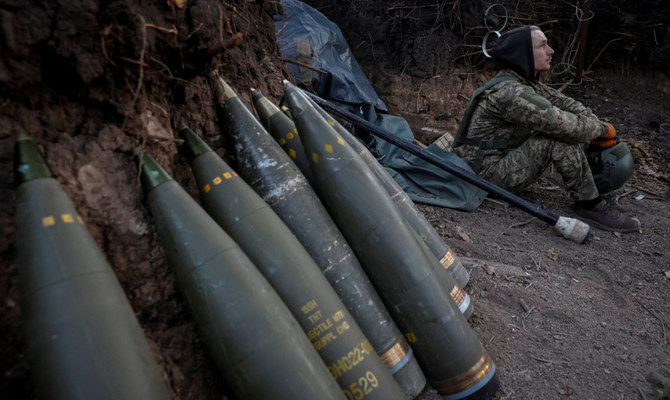
- Kyiv has been heavily reliant on billions of dollars of US military aid in its war with Russia following Moscow’s full-scale invasion in February 2022
WASHINGTON, United States: The United States is the first to acknowledge that its long-awaited $61 billion aid package for Ukraine is not a "silver bullet."
As weapons and ammunition are rushed to the country, other issues such as manpower shortages in Kyiv's struggling military have come to the fore.
Meanwhile, the monthslong delay in passing the aid package — caused by wrangling among US lawmakers — has further weakened Ukraine's position on the battleground, according to analysts.
President Joe Biden, who quickly signed the law Wednesday after it passed Congress, said the bill "should have gotten there sooner."
Jake Sullivan, his National Security Advisor, said the aid package "will make a difference," but warned "there is no silver bullet in this conflict."
"One capability is not going to be the ultimate solution," Sullivan told a White House briefing, though he added "Ukraine's position in this conflict will improve and we believe that Ukraine can and will win."
Kyiv has been heavily reliant on billions of dollars of US military aid in its war with Russia following Moscow's full-scale invasion in February 2022.
But in recent months Ukrainian forces — outgunned and outmanned — have struggled to hold back Russian troops.
And in the United States — Ukraine's largest provider of military assistance — a bogged-down Congress had not approved large-scale funding for Kyiv since December 2022 before the new package was passed this week.
It contains nearly $14 billion to train, equip and finance the needs of the Ukrainian army.
Manpower shortage
Garret Martin, of the American University School of International Service in Washington, said the delay by US lawmakers in passing the aid package "had a cost."
"The aid can shore up Ukraine but it's not a magic wand that could fix all the challenges they face," Martin said.
"What the package cannot do is deal with the shortage of manpower," he added.
Biden and his Ukrainian counterpart Volodymyr Zelensky have discussed the manpower issue, according to the White House.
In April, Kyiv reduced the minimum age for military conscription from 27 to 25, making thousands more men eligible for the draft.
And this week, it stopped issuing new passports abroad to military-aged Ukrainian men, as part of measures to push them to return home and fight.
Max Bergmann, of the Center for Strategic and International Studies, said that the impact of American aid would depend on European efforts.
"European nations need to ramp up (weapons) production now," Bergmann said.
"Europe's goal should be to put itself in a position to potentially fill a future gap left by the United States should it not pass another supplemental."
Bergmann said that Ukraine should use 2024 to "hold the line, exhaust and attrit Russian forces," with next year possibly presenting an opportunity for a Kyiv offensive.
Malala Yousafzai vows support for Gaza after backlash
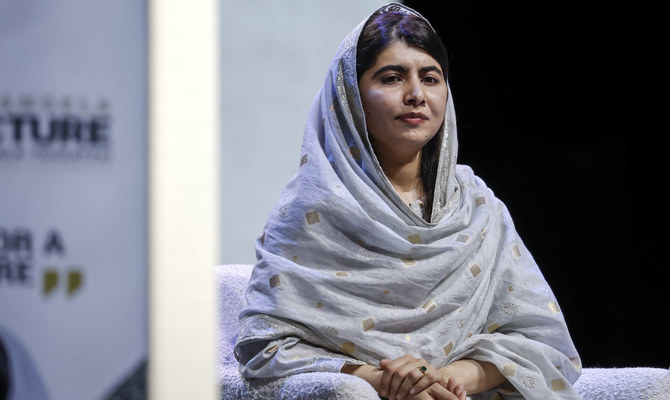
- Pakistan has seen many fiercely emotional pro-Palestinian protests since the war in Gaza began last October
LAHORE, Pakistan: Nobel laureate Malala Yousafzai on Thursday condemned Israel and reaffirmed her support for Palestinians in Gaza, after a backlash in her native Pakistan over a Broadway musical she co-produced with former US Secretary of State Hillary Clinton.
Yousafzai, who was awarded the Nobel Peace Prize in 2014, has been condemned by some for partnering with Clinton, an outspoken supporter of Israel's war against Hamas.
The musical, titled "Suffs," depicts the American women's suffrage campaign for the right to vote in the 20th century and has been playing in New York since last week.
"I want there to be no confusion about my support for the people of Gaza," Yousafzai wrote on X, the former Twitter. "We do not need to see more dead bodies, bombed schools and starving children to understand that a ceasefire is urgent and necessary."
She added: "I have and will continue to condemn the Israeli government for its violations of international law and war crimes."
Pakistan has seen many fiercely emotional pro-Palestinian protests since the war in Gaza began last October.
Yusafzai's "theatre collaboration with Hillary Clinton -- who stands for America's unequivocal support for genocide of Palestinians -- is a huge blow to her credibility as a human rights activist," popular Pakistani columnist Mehr Tarar wrote on social media platform X on Wednesday.
"I consider it utterly tragic."
Whilst Clinton has backed a military campaign to remove Hamas and rejected demands for a ceasefire, she has also explicitly called for protections for Palestinian civilians.
Yousafzai has publically condemned the civilian casualties and called for a ceasefire in Gaza.
The New York Times reported the 26-year-old wore a red-and-black pin to the "Suffs" premier last Thursday, signifying her support for a ceasefire.
But author and academic Nida Kirmani said on X that Yousafzai's decision to partner with Clinton was "maddening and heartbreaking at the same time. What an utter disappointment."
The war began with an unprecedented Hamas attack on Israel on October 7 that resulted in the deaths of around 1,170 people, according to an AFP tally of Israeli official figures. Hamas militants also abducted 250 people and Israel estimates 129 of them remain in Gaza, including 34 who the military says are dead.
Clinton served as America's top diplomat during former president Barack Obama's administration, which oversaw a campaign of drone strikes targeting Taliban militants in Pakistan and Afghanistan's borderlands.
Yousafzai earned her Nobel Peace Prize after being shot in the head by the Pakistani Taliban as she pushed for girls' education as a teenager in 2012.
However, the drone war killed and maimed scores of civilians in Yousafzai's home region, spurring more online criticism of the youngest Nobel Laureate, who earned the prize at 17.
Yousafzai is often viewed with suspicion in Pakistan, where critics accuse her of pushing a Western feminist and liberal political agenda on the conservative country.
Paradigm shift needed to meet massive needs of people in Gaza, UN Security Council hears
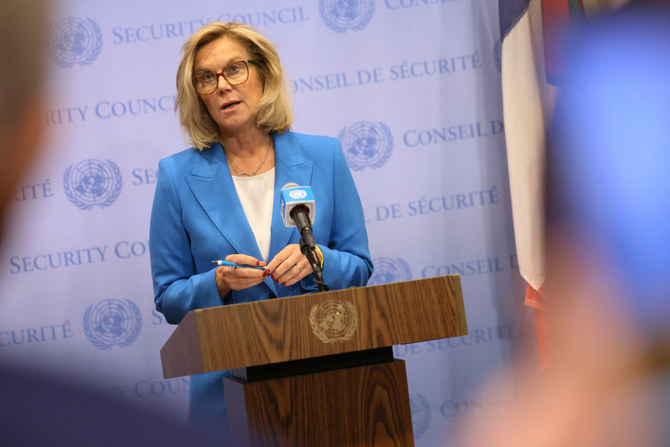
- It requires scaling up of volumes of aid, ensuring safety of humanitarian workers, and making preparations now for the reconstruction and recovery process
- Sigrid Kaag warns disease threatens to sweep through the territory and children are deprived of nutrition, protection and education, their futures hanging in the balance
NEW YORK CITY: The UN said on Wednesday that if it is to avert the threat of famine and meet the massive humanitarian needs of the civilian population in Gaza in a safe and secure manner, a paradigm shift is needed.
This will require scaling up of volumes and distribution of aid, ensuring safety of workers delivering assistance inside the territory, and making a start now on preparations for the reconstruction and recovery process.
Underscoring the fact that there is no substitute for the political will to sustain such work, Sigrid Kaag, the senior humanitarian and reconstruction coordinator for Gaza, echoed repeated calls by UN Secretary-General Antonio Guterres for a ceasefire, the immediate and unconditional release of all hostages held by Hamas, and the unrestricted flow of humanitarian aid to the population of the ravaged enclave.
She also expressed grave concern about a threatened Israeli incursion into the city of Rafah in southern Gaza, which has become the last refuge for more than 1.5 million Palestinians, most of them displaced by fighting in other parts of the territory.
A ground attack “would compound an ongoing humanitarian catastrophe, with consequences for people already displaced and enduring severe hardships and suffering,” she said.
Kaag was appointed by Guterres following the adoption of Security Council Resolution 2720 in December last year, which called on him to task a senior official with “facilitating, coordinating, monitoring and verifying” in Gaza, as appropriate, the humanitarian nature of all humanitarian relief consignments provided through states that are not parties to the conflict.
As she shared her assessments with members of the Security Council on Wednesday, Kaag said Israel continues to reel under the “deep trauma” of the Oct. 7 attacks by Hamas and the uncertainty about the fate of the remaining hostages. Meanwhile more than 34,000 people have been killed in Gaza, tens of thousands injured or maimed, and livelihoods, homes, schools and hospitals have been destroyed, she added.
“The health infrastructure in Gaza has been decimated” and the few hospitals left standing are operating amid severe shortages of supplies and frequent power outages, Kaag said.
“As summer draws near and temperatures rise, communicable diseases threaten to sweep through Gaza. Children, who in every crisis suffer the worst and the most, are deprived of nutrition, protection and education, their futures hanging in the balance.
“The scarcity of food and other essential goods has also led to a breakdown in civil order and the gradual unraveling of the social fabric in Gaza.”
Effective humanitarian operations cannot be reduced “to counting trucks,” Kaag said as she emphasized the important need for humanitarian agencies to be able to transport consignments of food, medicine and other supplies safely using all possible routes and crossings. In this context, she said, the work of the UN Relief and Works Agency for Palestine Refugees is “pivotal.”
She added: “UNRWA is irreplaceable and indispensable as a humanitarian lifeline and must be allowed to deliver on its mandate.”
The agency has been facing a severe crisis since Israeli authorities alleged in January that a dozen of its workers participated in the Oct. 7 attacks. A report published this week following an independent review of UNRWA revealed that Israel has yet to provide any proof in support of the allegations, and noted that for the past 13 years, authorities in Tel Aviv failed to raise any concerns about individuals named on staffing lists the agency shared with them.
This month, in response to international pressure, Israel made several commitments intended to improve the delivery of humanitarian supplies to Gaza, including scaling up of volumes of aid, the opening of additional border-crossing points and for longer hours, repairs to a damaged water pipeline, and permission for bakeries in northern and central Gaza to resume making bread.
However, given the scope of the destruction and the extent of the human suffering in the territory, Kaag said “further definitive and urgent steps are needed.” These include repairs to roads, timely provision of authorization for aid convoys, arrangements for evacuations of hospital patients and casualties, and more-effective mechanisms for protecting humanitarian workers on the ground.
She also spoke of efforts to streamline the delivery of aid shipments to Gaza from Jordan, Egypt and Cyprus, with the UN proposing an inspection, monitoring and verification unit be established on the Palestinian side of border with Egypt at Rafah.
However, she said that although work to build a floating port and pier on the Gaza shore continues to advance, a maritime corridor from Cyprus “can never be a substitute for delivery by land. Land routes are the only way to bring in the bulk of supplies needed.”
The extent of the destruction and the devastating effects of the war on the entire population call for an ambitious, comprehensive plan of support, with the level of investments this requires, Kaag said. The scale of the investment required is clearly revealed by the need to “rebuild and repair more than 84 percent of destroyed health facilities” and for “the return of an entire student population to school while educational facilities have been destroyed.”
She added: “The Palestinian Authority has a critical role to play in Gaza. The international community must work toward enabling its return, strengthen its governance capacity, and prepare it to reassume its responsibilities in Gaza.
“All efforts toward early recovery and reconstruction also need the participation of Palestinian civil society. Fostering a conducive environment to reestablish the commercial sector in Gaza and the engagement of the Palestinian business community and its investors are equally important.”
State Department official reaffirms US commitment to humanitarian aid for Gazans
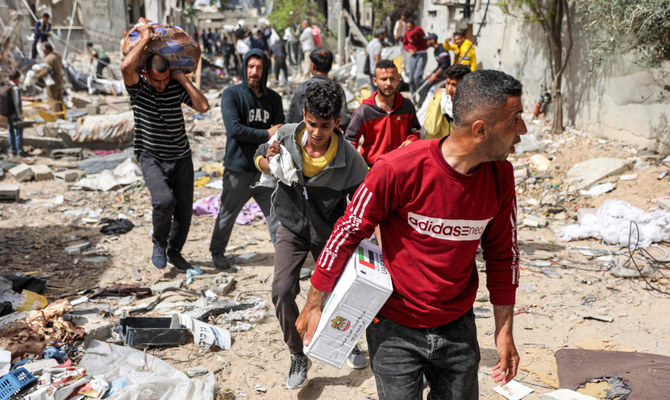
- Efforts also continue in Washington to prevent regional expansion of conflict by Iran and its proxies, says Assistant Secretary for Near East Affairs Barbara A. Leaf
- The Biden administration is also looking into the circumstances surrounding the discovery this week of mass graves in Gaza, she adds
CHICAGO: The US is working to speed up the delivery of humanitarian aid to the people of Gaza, all of whom are at risk of malnutrition or famine, a leading official from State Department said on Wednesday.
Assistant Secretary for Near East Affairs Barbara A. Leaf also said that efforts continue in Washington to deter Iran and its proxies from attempting to provoke any regional expansion of the conflict, amid concerns about escalations in violence in Iraq, Lebanon, Europe and Yemen.
President Joe Biden and Secretary of State Antony Blinken remain committed to securing peace between Israel and the Palestinians through direct negotiations, Leaf said, and to using all available means to provide the population of Gaza with aid, including the UN Relief and Works Agency for Palestine Refugees.
The Biden administration is also examining the circumstances surrounding the discovery this week of mass graves in Gaza, she added. Officials are “making inquiries and trying to learn, ourselves” but she had no additional information to share at this time.
Regarding the humanitarian crisis in the Gaza Strip, Leaf said: “One hundred percent of the population in Gaza is at risk of famine and malnutrition. Deconfliction (a military term for efforts to reduce the risk of friendly fire or the targeting of noncombatants) coordination remains a major issue for humanitarian workers and exports.
“We are pushing to accelerate the delivery of assistance on all fronts by air, land and sea. We urge Israel, and continue to urge Israel, to improve deconfliction and take tangible steps to allow the entry of more aid, and distribution of that aid, throughout Gaza. We also believe the UN, including UNRWA, is indispensable for that effort.
“We are committed to advancing enduring peace and security for Israelis and Palestinians alike, including through practical time-bound and irreversible steps to work toward establishing a Palestinian state existing side-by-side with Israel.”
Leaf declined to comment on how funding would be directed to help address the “extreme” humanitarian needs in Gaza but acknowledged that the US Congress and several other major donor countries had suspended funding for UNRWA following allegations in January by the Israeli government that 12 of the agency’s workers participated in the Oct. 7 attacks by Hamas on Israel.
A report published this week following an independent inquiry into UNRWA’s mechanisms for ensuring the neutrality of its workers stated that Israeli authorities have not provided any evidence to back up their claims. Some countries have resumed their funding of the agency but the US has not.
“The Congress has ruled out the US providing assistance directly to UNRWA,” said Leaf. “There are many other avenues, channels and organizations by which we can assist the Palestinian people.
“We do recognize that the functions that UNRWA carries out are indispensable and that there is no ready replacement for UNRWA in carrying out those responsibilities, or for the staff that puts their lives at risk every day to carry out those functions. We are certainly encouraging all of our donor partners to look to these needs in a coordinated way.”
Leaf defended the decision of the Biden administration last week to veto a Security Council resolution calling for recognition of Palestine as full member state of the UN, on the grounds that the resolution “makes no sense” because Palestine does not have identifiable borders. She added that Biden “stands firmly behind the very legitimate quest of the Palestinians for a state of their own” but “peace must come through direct negotiations with Israel.”
The goal of the Biden administration is to “reunify” the West Bank and Gaza Strip under the leadership of a reformed Palestinian Authority, Leaf said, paving the way for a two-state solution through negotiations between Palestinians and Israelis.
“The West Bank and Gaza must be reunified under the Palestinian Authority,” she added. “A revitalized PA is essential to delivering results for the Palestinian people in both the West Bank and Gaza, and establishing the conditions for stability.”
Commenting of the wider regional situation, Leaf condemned the escalation of violent attacks by Iran and its proxies, including Hezbollah in Lebanon and the Houthis in Yemen.
She described Houthi attacks on shipping in the Red Sea over the past few months as “outrageous” and said they represent “recklessness and inhumanity on the part of the Houthis in targeting commercial vessels, some military vessels, but commercial vessels that have absolutely nothing to do with the conflict in Gaza. It really moots the notion that these attacks are in some way going to support the Palestinian cause. They do not. What they do is put innocent civilians in harm’s way.”
Leaf also condemned the Iranian missile strikes that targeted Israel last week but did not mention the Israeli missile strikes that killed 12 people at an Iranian consulate building beside the nation’s main embassy in the Syrian capital, Damascus, the week before.



